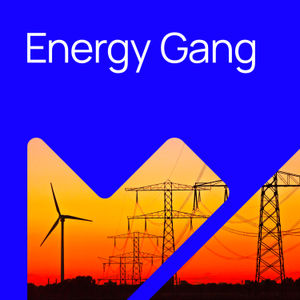
The Energy Gang
Wood Mackenzie
Live from COP29: Everyone is talking about climate finance. What do they mean?

Live from COP29: Everyone is talking about climate finance. What do they mean?
Description
How a deal at the climate talks could make a real difference to the energy transition
In our latest episode from the COP29 climate talks in Baku, Azerbaijan, Ed Crooks explores the challenges and opportunities of mobilizing climate finance to support the energy transition in emerging markets.
As the "Finance COP", COP29 is under pressure to deliver concrete outcomes on climate finance. The goal is an agreement that could mean $1 trillion a year or more flowing from rich countries to low and middle-income countries, to finance cuts in greenhouse gas emissions and investments to help communities adapt to the impacts of climate change.
But what does climate finance really mean for countries tackling the climate challenge? And how can innovative funding solutions and systemic reforms ensure that financing reaches the countries and projects that need it most?
On this episode, Ed is joined by Raquel Moses of the Caribbean Climate Smart Accelerator, which helps low-carbon energy projects in the region find commercial backers. She emphasizes the importance of disaggregating climate finance into grants, equity, concessionary loans, and other forms of lending, and explains why it is so important for everyone at COP29 and beyond to be clear about what they mean when they talk about it. Clarity on funding is critical for clearing obstacles to project development, particularly in the Caribbean and other emerging markets.
Ben Attia of Allied Climate Partners also joins the discussion. He highlights the shortage of bankable projects in emerging markets, and explains how his organization deploys philanthropic capital to de-risk early-stage infrastructure developments. By preparing projects for commercial investment, ACP helps bridge the gap between available funding and viable projects.
Raquel and Ben argue that addressing systemic issues, including the lack of early-stage equity investment, the complexity of aggregating small projects, and the risks associated with currency fluctuations in emerging markets, are essential to unlocking the $1 trillion-plus in annual climate finance needed to meet global goals.
Finally, Ed talks to JP Thia, lead economist of the Asian Infrastructure Investment Bank (AIIB), to discuss the particular challenges for climate finance in Asia. It’s a region with large and often fast-growing economies, with a hunger for increased energy supply. JP discusses the importance of pairing climate goals with economic development, to align incentives and drive participation from the Global South.
See Privacy Policy at https://art19.com/privacy and California Privacy Notice at https://art19.com/privacy#do-not-sell-my-info.